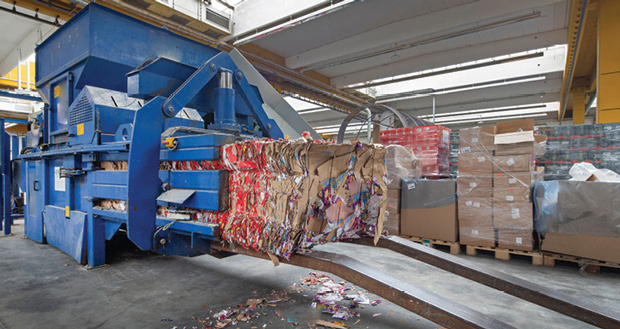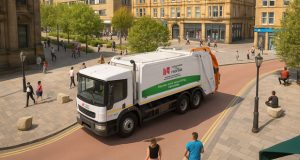 Leasing offers facilities management a great option for upgrading their recycling and waste management equipment, says Liam Coleman, grenke UK’s Branch Leader Bristol
Leasing offers facilities management a great option for upgrading their recycling and waste management equipment, says Liam Coleman, grenke UK’s Branch Leader Bristol
Facilities managers are under pressure to utilise efficient, eco-friendly waste management and recycling practices that support sustainability and operational excellence. Whether it is compactors and balers or sorting and screening machinery, the pressure is on. Meanwhile, the sector must contend with more complexity, more scrutiny, and more expectation than ever before, with pressure to extract value, minimise harm and meet the rising demands of regulators, customers and investors.
With such a rapid pace, how can they stay on top of the costs of investing back into a business, to access the best equipment to deliver on their recycling and waste management targets?
CHALLENGE: FINANCE
Grenke’s recent New Lease of Life report – surveying 500 SME leaders and decision makers – found that 69 per cent of SMEs cited access to finance as a key business challenge. At the same time, 75 per cent believed that new assets and equipment would help re-energise their business and support future growth. Yet currently, just 44 per cent of UK SMEs lease some of their equipment. The question is, are they being smart enough about their options? Could leasing be a way of helping to drive growth, improve innovation and productivity and ensure organisations are investing in their futures?
It’s not just SMEs turning towards asset finance. At grenke UK, we’re seeing a surge in global organisations turning to asset finance to support their growth plans. Despite being cash-rich and unquestionably having the resources to buy outright, wider uncertainty and cash flow pressures means that more businesses are opting to pay for equipment out of their OpEx budgets rather than their CapEx ones. Unsurprising given that as a hard asset, recycling and waste management equipment is perfect to offer as a leasable asset.
THE BIG EFFICIENCY BARRIER
The ‘New Lease of Life’ report further identified a growth roadblock that stopped us in our tracks: 53 per cent of SMEs currently operate with suboptimal equipment. If we break this figure down further, this consists of 36 per cent of equipment which is adequate but not optimal and could do with upgrading, and 17 per cent that doesn’t work or is no longer used.
Think about the impact this has on the day-to-day operations of a business and the impact on waste efficiency and productivity. If over half of the UK’s SMEs are looking to achieve their growth ambitions with sub-par equipment, what is the true opportunity cost? How is existing equipment impacting project delays, increasing workloads for operational teams and even risking quality?
Leasing offers the opportunity to upgrade to newer equipment as technology advances, ensuring a business can meet evolving customer needs. This is of especially important for areas like recycling and waste management where innovation and tech advancement means that equipment becomes rapidly outdated.
With the digital transformation of waste management well underway – from AI-driven sorters, and route optimisation software through to paperless weighbridges and automated diagnostics – the gap between early adopters and the rest is widening fast. And while FM operators that invest in tech are seeing huge benefits, be it increased throughput or better contract wins, they’re also driving other key areas such as staff engagement and equipping their people to deliver to the best of their potential.
UNLOCKING THE POTENTIAL OF LEASING
At grenke, we believe leasing is no longer just a financial tool – rather it can be a strategic enabler for businesses to invest, grow, stay ahead of their competitors. Here are the key benefits that leasing finance can bring a business:
- Alignment with strategic goals: Leasing frees up the opportunity to support long-term objectives including people development and competitive differentiation through digitisation, all while preserving cash flow.
- Cost management: Leasing provides predictable payment structures that fit within controlled budgets, offering a pathway to cutting-edge, market leading equipment without the large upfront costs.
- Tailored flexibility: Whether it’s upgrading your compactor or investing in energy-efficient recycling systems, leasing allows firms to align asset investments with evolving priorities.
- Maintaining managed solutions: For a business, the cost of equipment maintenance can be high, but as these costs are built into leasing contracts transparently, leasers receive a fully maintained managed solution with no capital outlay. We know technology means shelf-lives are getting shorter by the second, with equipment constantly requiring replacement, removal, and disposal. Opting for five-year fully maintained solutions will also include upgrades at the end of the term.
- Sustainability: With environment so high on the waste and recycling agenda, leasing can support an organisation’s progress towards carbon-neutral operations and eco-friendly practices.
The question always comes back to this: what is the cost of not investing? Look for tailored leasing solutions designed specifically for the recycling and waste management sector. This means simplified finance, and streamlined, transparent leasing processes and comprehensive asset support – allowing FMs to focus on running an organisation to drive performance, productivity and growth.





